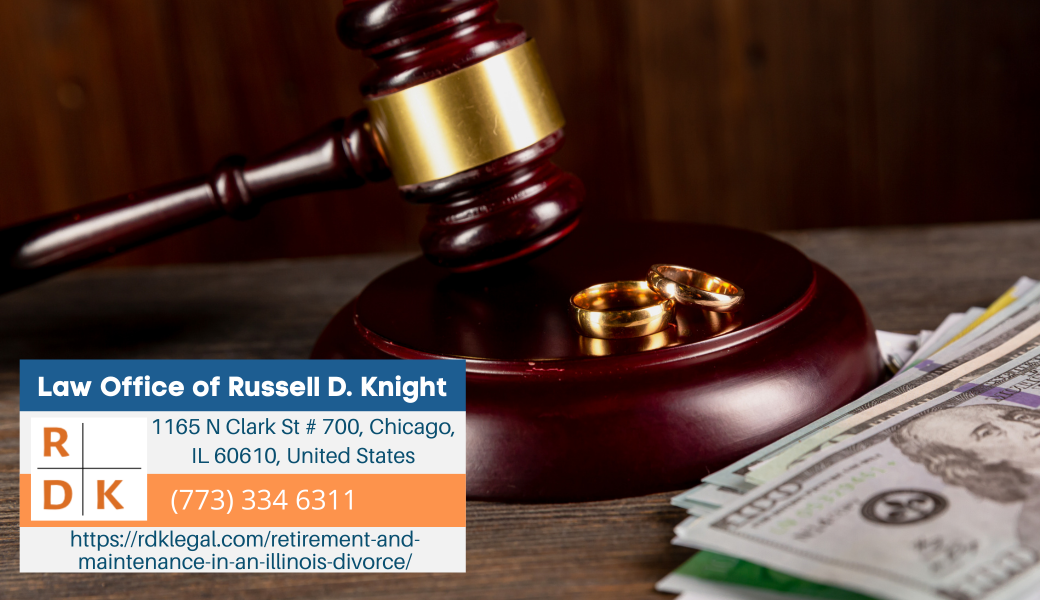Chicago divorce lawyer Russell D. Knight (https://rdklegal.com/retirement-and-maintenance-in-an-illinois-divorce/) of the Law Office of Russell D. Knight has recently published a comprehensive article titled "Retirement and Maintenance in an Illinois Divorce." This insightful piece discusses the complexities surrounding the intersection of retirement and spousal maintenance, offering valuable guidance for individuals navigating divorce proceedings in the state of Illinois.
In the article, Chicago divorce lawyer Russell D. Knight explains the concept of maintenance, formerly known as alimony, as a means to ensure equitable financial support between spouses with unequal incomes. According to Illinois law, the spouse who has been reliant on the other for financial support should continue to receive assistance for a defined period. However, the article highlights the challenges that arise when the supporting spouse is nearing retirement during this period.
"Ordering maintenance for a defined duration makes sense if the supporting spouse is working for the entirety of that period," says Chicago divorce lawyer Russell D. Knight. "But if retirement is on the horizon, certain considerations must be taken into account to ensure fairness."
The article outlines the standard calculation method for maintenance in Illinois, which is typically determined on a "guidelines basis." Under these guidelines, maintenance is calculated by taking one-third of the payor's net annual income and subtracting one-quarter of the payee's net annual income. Additionally, there is a cap to prevent the payee from receiving more than 40% of the combined net income of both parties. This structured approach provides a foundation for calculating maintenance but does not account for the impending retirement of the supporting spouse.
For those approaching retirement amidst divorce proceedings, Chicago divorce lawyer Russell D. Knight emphasizes the importance of notifying all parties involved, including the divorce judge, about the pending retirement. Several factors considered by the court in awarding maintenance are directly impacted by retirement, which can influence both the amount and duration of maintenance.
"Future income, as well as current income, must be considered when determining maintenance," explains Knight. "Retirement can be viewed as a substantial change in circumstances, allowing for potential modification of maintenance at the time of retirement."
The article also addresses scenarios where retirement occurs after the Illinois divorce is finalized. In such cases, maintenance can be modified unless both parties have agreed otherwise. While Illinois courts generally frown upon voluntary employment changes for maintenance modification, good faith retirements, based on valid reasons such as age and health, are recognized.
Knight advises that those receiving maintenance should argue for its continuation post-retirement by demonstrating the retiring spouse's ability to afford the payments. Additionally, if the retirement is a result of the retiree's personal choices, the receiving spouse should not be penalized.
The article further discusses the role of retirement assets in maintenance considerations. Illinois divorce courts evaluate the property awarded to each party, including retirement benefits, to determine maintenance amounts and duration. However, income generated from already-divided retirement assets cannot be used to calculate maintenance, avoiding double-dipping into the same financial resources.
Knight also clarifies that public assistance eligibility, such as social security benefits, cannot be used as grounds to reduce maintenance. This ensures that maintenance obligations remain consistent regardless of external financial support.
For individuals facing retirement or dealing with a spouse's retirement in the context of an Illinois divorce, understanding the relevant laws and their application is crucial. The article by Chicago divorce lawyer Russell D. Knight serves as an important resource, providing clarity and guidance on these complex issues.
Those interested in learning more about the impact of retirement on maintenance in an Illinois divorce are encouraged to read the full article on the Law Office of Russell D. Knight's website. For personalized legal advice, individuals can schedule a free consultation with a knowledgeable Chicago divorce lawyer from the firm.
About the Law Office of Russell D. Knight:
The Law Office of Russell D. Knight is a leading family law firm based in Chicago, Illinois. The firm is dedicated to providing compassionate and effective legal representation in various family law matters, including divorce, child custody, and spousal support. With a commitment to client-centered service, the team at the Law Office of Russell D. Knight strives to achieve the best possible outcomes for their clients.
Embeds:
Youtube Video: https://www.youtube.com/watch?v=pGv8wQzsG9g
GMB: https://www.google.com/maps?cid=13056420905624162796
Email and website
Email: russell@rdklegal.com
Website: https://rdklegal.com/
Media Contact
Company Name: Law Office of Russell D. Knight
Contact Person: Russell D. Knight
Email:Send Email
Phone: (773) 334-6311
Address:1165 N Clark St #700
City: Chicago
State: Illinois 60610
Country: United States
Website: https://rdklegal.com/

